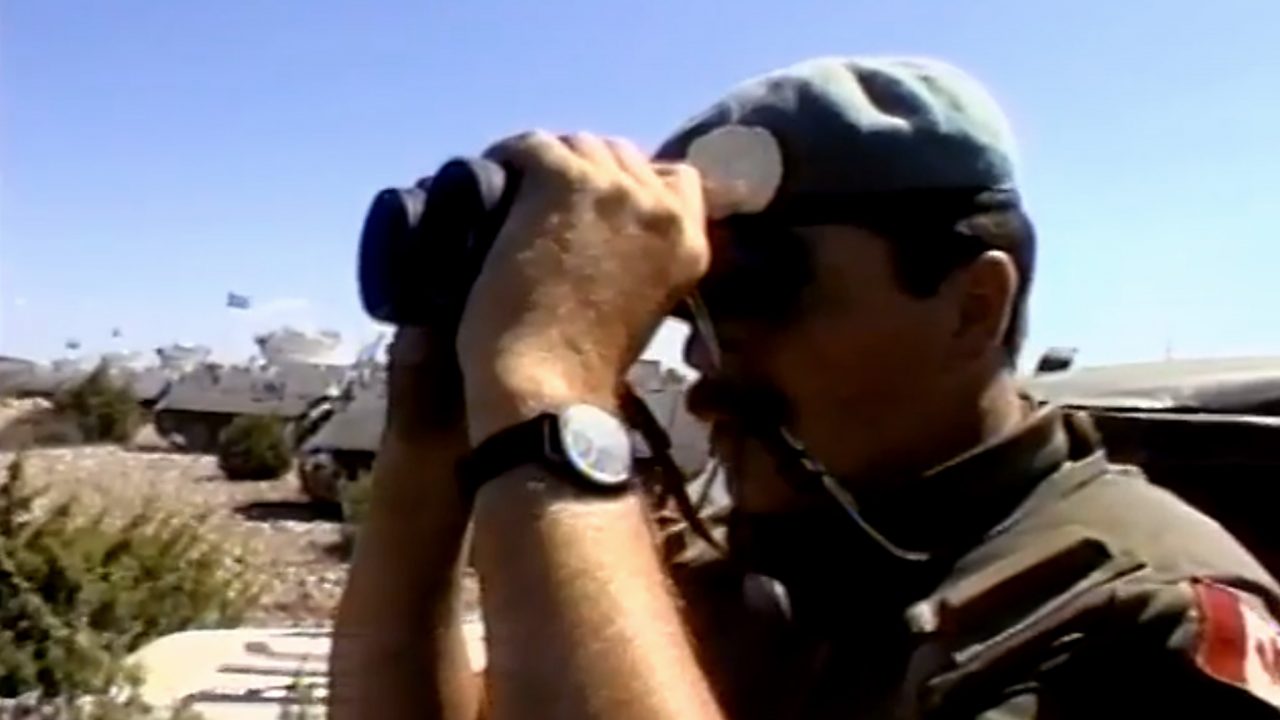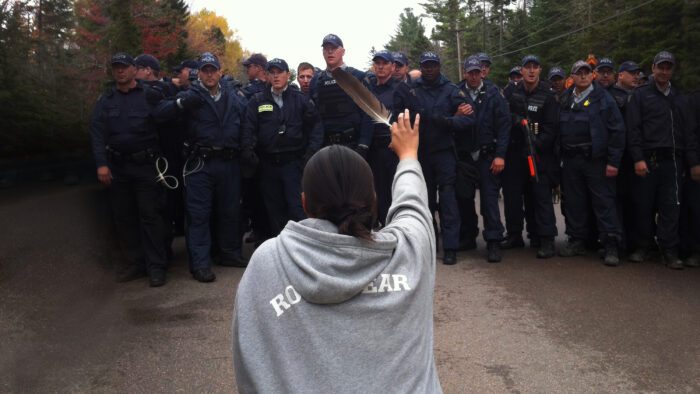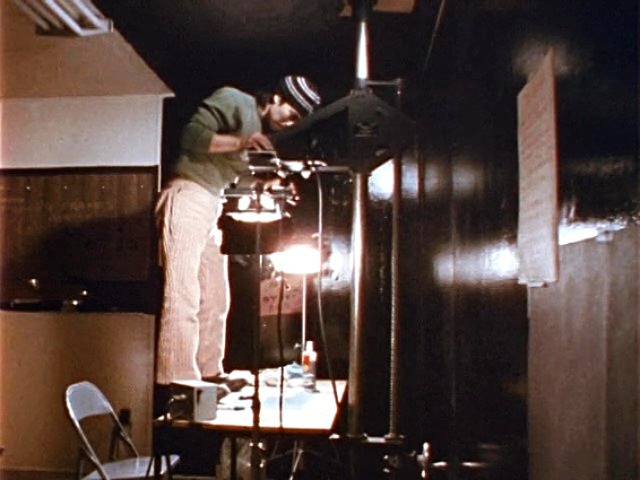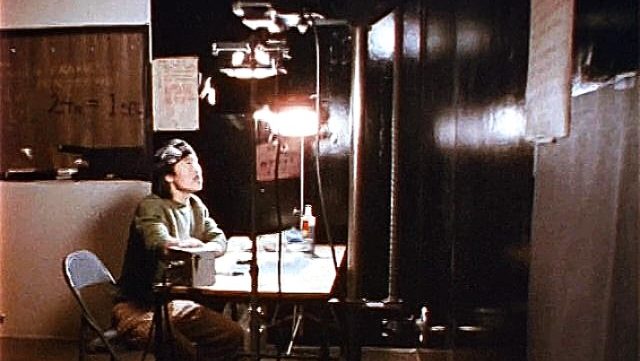
Protection Force: Peacekeeping Above and Beyond the Call of Duty | Curator’s Perspective
Protection Force: Peacekeeping Above and Beyond the Call of Duty | Curator’s Perspective
In the summer of 1994, the late filmmaker Garth Pritchard and cameraman Rick Gustavsen spent three and a half months in the former Yugoslavia (specifically, in Bosnia and Croatia) filming several Canadian regiments in the course of their duties as United Nations Peacekeepers.
The result was the three-part series Protection Force, which was broadcast on the CBC the following year, to terrific reviews. The filmmakers were given unprecedented access to the peacekeepers. I believe these films are a must-see for all Canadians who question the need and usefulness of our participation in peacekeeping missions in the world’s most dangerous conflicts.
For those who are not familiar with the Balkan conflict, let me point out that the “Yugoslav wars” took place from 1991 until 2001. These included separate but related ethnic conflicts, wars of independence, and insurgencies that were fought in what was then Yugoslavia. It was the deadliest European conflict since World War 2. Over 130,000 people died, with rampant war crimes and acts of genocide. A multinational peacekeeping force consisting of peacekeepers from 42 countries, including Canada, was set up by the United Nations. It was during this conflict that Pritchard and Gustavsen filmed the Canadian troops.
The first film in the series, Caught in the Crossfire, follows the Princess Patricia Canadian Light Infantry and Lord Strathcona Horse Regiments in Bosnia and Croatia. As they clearly state in the film, their role is not to take sides but to try and stabilize the situation. This is obviously not as simple as it sounds, and is fraught with many dangers. Their duties include military liaison with all the warring parties, coordinating prisoner exchanges, de-mining, and basically trying to protect the civilians caught in the middle of this terrible war, in which three different sides fought for territory and power.
At one point they meet with a Serbian commander who says that of all the UN’s peacekeepers, the Canadians are the only ones who haven’t taken sides. The troops are then shown demonstrating their firepower and shooting back at snipers. We are told that if they don’t, they will not be taken seriously and will have no leverage in the conflict.
They need the leverage, as a great deal of their duties revolve around providing security for civilians on all sides. One poignant moment has the Canadians moving an elderly Serbian couple out of the Muslim-controlled zone to an area where their family lives, leaving behind their farm and all of their possessions forever.
There is also a moment where a soldier talks about finding an abandoned mental hospital and feeding the residents, as well as changing the diapers of bedridden patients. Clearly, this is above and beyond the call of duty.
Caught in the Crossfire, Garth Pritchard, provided by the National Film Board of Canada
The second film, one that touched me deeply, is In God’s Command. In it, we meet a 33-year-old Roman Catholic priest, Captain Marc Sargent, who struggles with the absolute savagery of this war, stating that the hate in this conflict is almost “genetic.” How else can one explain the desecration of graves and the bodies in them? Sargent’s duties are many. He is there to lend a friendly ear to the Canadian soldiers when they are troubled (which is often); he performs mass for the various UN soldiers; and, at one point, he baptizes a soldier—in the war zone! As he points out, he is there to be a social worker, father, mother, friend and confidant to the soldiers. He is also one of the only peacekeepers who’s allowed to visit civilians in all zones, to help them or provide religious services for them.
Sargent is a warm, caring man. He does everything in his power to aid both the soldiers and the civilians. I want to point out two terrific scenes in the film. In the first, he performs mass for a group of Kenyan peacekeepers. The respect and admiration of the Kenyans for “the Padre” is obvious in this beautiful moment. The second sequence I want to highlight is Sargent’s conversations with a young soldier who wishes to be baptized. As Sargent says, the soldier was able to find the gift of faith even in this war-torn place.
Although this is the second film in the series, it was the first to be broadcast on the CBC. It was cut to a half hour and aired (under the title The Padre) as an episode of Man Alive (a long-running TV documentary program focusing on faith and spirituality) on April 13, 1995, just in time for Easter. Reviews were ecstatic, with the Calgary Herald calling it “a moving portrait” and the Edmonton Journal describing it as “a sobering, ennobling glimpse of Canadian peacekeepers.”
In God’s Command, Garth Pritchard, provided by the National Film Board of Canada
The third film in the trilogy is The Price of Duty, which follows the 1 Combat Engineer Regiment in their de-mining duties in a zone with an estimated 600,000 mines! We’re introduced to several de-miners, including Corporal Marc Isfeld, who was killed doing this extremely dangerous work, and became the 10th Canadian soldier to die in the Balkan conflict. The film is gut-wrenching at times, especially when Sergeant Greg James, who was injured in the same incident that killed Isfeld, recounts the events.
There is also an extended sequence in which the soldiers (including Isfeld) find a mine in a pump house in a farmer’s field and spend a very nervous few minutes defusing it.
We later hear from Isfeld’s parents, who grieve their son but also criticize the media for the way they reported the death, choosing to focus on O.J. Simpson’s troubles with the law instead.
The Price of Duty, Garth Pritchard, provided by the National Film Board of Canada
I should point out that distinguished journalist and military historian Gwynne Dyer wrote and narrated the three films. This trilogy shows dedicated, caring people trying to bring some stability to a region where violence and hatred are prevalent. I strongly urge you all to watch these films and get a better understanding of why Canada participates in peacekeeping missions. May their great work be an inspiration for us all, and may their sacrifices never be forgotten.



